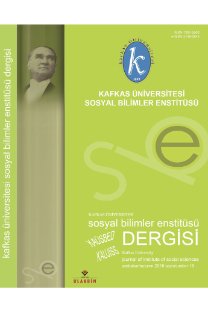HOWARDS END: THROUGH THE LENSES OF BOURDIEUSIAN CAPITAL THEORY UNDER THE GUISE OF MODERNISM
E. M. Forster’s novel “Howards End” implicitly employs Pierre Bourdieu’s capital theory with its concepts such as economic, social, cultural and symbolic capital by endowing its characters with different culturally embedded habitus. The characters, each of which belong to upper, middle and lower classes, are the representatives of their hierarchically structured classes. While each of the characters are donated with certain levels of capital, they struggle to compete to be powerful in the Edwardian society where injustices occur in all spheres of life. Thus, this paper attempts to analyze Bourdieusian manners and perception of fe(males) with an emphasis on modernity.
Howards End: Modernizm Kisvesi Altında Bourdieu’nun Kapital Kuramı Bakış Açısıyla
E. M. Forster’ın “Howards End” adlı romanı dolaylı olarak Pierre Bourdieu’nun ekonomik, sosyal, kültürel ve sembolik kapital kavramlarını kullanmaktadır. Roman karakterlerini farklı kültürel alışkanlıklarla (habitus) donatarak aslında Bourdieu’nun kapital kuramını işlemektedir. Üst, orta ve alt sınıftan olan karakterlerin tümü hiyerarşik biçimde yapılandırılmış sınıfları temsil ederler. Bu karakterlerin her birine belirli seviyelerde kapital verilse de yaşamın her alanında haksızlıkların olduğu Edward dönemi toplumunda güçlü olmak için mücadele etmek zorunda kalırlar. Bu çalışma, romandaki modernizme vurgu yaparak kadın ve erkek karakterlerin Bourdevari tavır ve algılarını ortaya çıkarmayı amaçlamaktadır.
___
Bourdieu, P. (1977). Outline of a theory of practice. Cambridge: Cambridge University Press.Bourdieu, P. (1984). Distinction: A social critique of the judgment of taste. (Trans.) Richard Nice. Cambridge, MA: Harvard UP.
Bourdieu, P. (1986). “The forms of capital” in Richardson, J., Handbook of Theory and Research for the Sociology of Education. Westport, CT: Greenwood, 241-58.
Bourdieu, P. (1990). In other words: Essays towards a reflexive sociology. Polity Press: Cambridge.
Bradbury, M. (1966). Two passages to India: Forster as Victorian and modern. Bradbury, Malcolm (ed.) E. M. Forster: A Collection of Critical Essays. New Jersey: Prentice Hall.
Crews, F. C. (1967). E. M. Forster: The perils of humanism. Princeton: Princeton UP.
Firchow, P. E. (1981). Germany and Germanic mythology in Howards End. Comparative Literature, 33(1), 50-68.
Forster, E. M. (1947). The collected tales of E. M. Forster. New York: Alfred A. Knopf, A Borzoi Book, “The Eternal Moment”.
Forster, E. M. (2007). Howards End. electronic classic series, Pennsylvania State University. (1st pub. 1910 by Edward Arnold, London).
Frank, K. (2009). Concerning E. M. Forster. London: Weidenfeld & Nicolson.
Gordon, M. (2004). “Things that can’t be phrased”: Forster and Howards End, Salmagundi, 143, 89-103.
Lucas, J. (1997). Discovering England: The view from the train, Literature and History, 6(2), 37-55.
Madran, C. Y. (2004). An archetypal analysis of E. M Forster’s fiction. Middle East Technical University. Unpublished Doctoral Dissertation.
Richard, O. (1990). Heralds of modernity: Cars and planes from invention to necessity. in M. Teich and Roy Porter (eds.), Fin de Siècle and its Legacy, Cambridge.
Rose, J. (2001). The intellectual life of the British working classes. New Haven: Yale University Press.
Sugate, A. S. (2012). The novels of E. M. Forster: A thematic study. Unpublished Doctoral Dissertation.
Thacker, A. (2000). E. M. Forster and the motor car. Literature & History, 9(2), 37-52.
Turner, H. S. (2000) Empires of objects: Accumulation and entropy in E. M. Forster’s Howards End. Twentieth-Century Literature. 46(3), 328-45.
White, L. (2005). Vital disconnection in “Howards End”. Twentieth Century Literature, 51(1), 43-63.
- ISSN: 1307-5500
- Yayın Aralığı: Yılda 2 Sayı
- Başlangıç: 2008
- Yayıncı: Kafkas üniversitesi Sosyal Bilimler Entitüsü
Sayıdaki Diğer Makaleler
BİR YAŞAM GRAFİĞİ OLARAK RUS EDEBİYATINDA “GÜNLÜK METİNLERİ”
YÖRÜKLERDE KIZ VERME GELENEĞİ ÜZERİNE BİR İNCELEME: HASAN BOĞULDU FİLM ÖRNEĞİ
PARİS ANLAŞMASINA GİDEN SÜREÇTE AB İKLİM DEĞİŞİKLİĞİ VE ÇEVRE POLİTİKALARI
M. Hakan KESKİN, Ferhat KÖKYAY
MAGGIE TULLIVER AS A NEW WOMAN IN GEORGE ELIOT’S THE MILL ON THE FLOSS
OSMANLI TARİH YAZICILIĞINDA BİR İNTİHAL ÖRNEĞİ TELHÎSÜ’L-BEYÂN FÎ TAHLÎSÜ’L-BÜLDÂN
Rukiye ÖZDEMİR, Süleyman LOKMACI
İMÂM RABBÂNÎ’DE ALLAH TASAVVURU
HOWARDS END: THROUGH THE LENSES OF BOURDIEUSIAN CAPITAL THEORY UNDER THE GUISE OF MODERNISM
